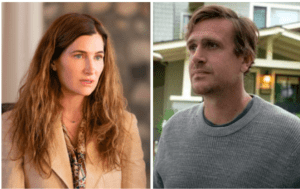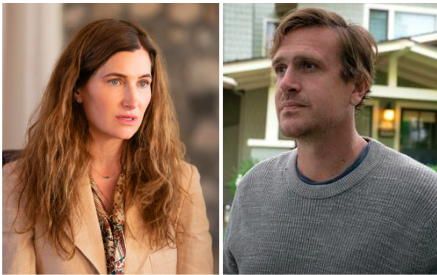
Photo credit: Hulu & AppleTV+
Grief is a theme that has casually been explored in TV shows in the past, but hasn’t really been the core tenet of shows—until now. And it’s for good reason, right? It’s grief. It’s messy, depressing, painful—it’s not necessarily what comes to mind when you think of ‘good’ or ‘enjoyable’ entertainment. Well, thanks to shows like AppleTV’s Shrinking and Hulu’s Tiny, Beautiful Things, it’s a theme finally being explored in all its unflinching pain, and all its comical beauty.
While the shows are tonally different, they each deal with the stages of grief in very similar ways—starting with the casting of their leads. Shrinking, which unsurprisingly comes from the minds of AppleTV’s other heartwarming hit Ted Lasso, cast Jason Segel as Jimmy, a therapist who is trying to heal himself from the loss of his wife, while still trying to heal other people. In Tiny, Beautiful Things, an adaptation of Cheryl Strayed’s collection of essays and produced by Reese Witherspoon’s Hello Sunshine, Claire, a character played by Kathyrn Hahn, is dealing with the loss of her mother as she herself tries to parent a teenage daughter. The casting of Segel and Hahn in their respective shows both play on the innate likability we have for both actors, a quality necessary given the messy and often ugly decisions the characters make.
Whether it’s Jimmy being ‘safe dick’ for his co-worker and best friend of his late wife, or Claire walking up an unnecessary amount of steps to tell off a teenage girl and subsequently going viral on TikTok, you still root and feel for these characters. You forgive their missteps because you know the path to healing isn’t linear; it’s filled with fuck ups and questionable choices.
But it’s not all regrets and tears—both characters also find ways to turn their grief into something beautiful. For Jimmy, he breaks what can only be called the ‘cardinal rule of therapy’ and chooses to start telling it like it to his patients. Your boyfriend’s a dick? Leave him! You can’t get a woman to love you? Maybe stop being a dick! It’s unfiltered, radical candor that leads to both positive (see: Sean) and negative outcomes (see: the final scene of the season). Claire also finds herself giving unfiltered advice, but hers comes in the form of an advice column called “Dear Sugar.” Where most advice columnists tend to keep the focus on those seeking answers, Claire aka Sugar dives into the trauma and pain of her past, giving advice that’s real, raw and necessary. Clearly, neither of these characters are in a place to be giving anybody advice. We as viewers know they’re barely hanging on themselves. Yet somehow by finding the humor and wisdom in their grief, they’re able to help people—and ultimately themselves—begin to heal.
Both shows also show the power of community when it comes to navigating life after loss. Claire finds her community in the people she writes back to, with each click of the keyboard, she’s reminding herself and those reading that they’re not alone; that being human is a universal experience. She find solace in the words she writes just as much as those reading them do. Jimmy finds community in the people who are helping keep his world afloat—especially during the times when he was drowning in despair. His boundary-less neighbor Liz, played to perfection by Christa Miller, steps in to help keep his daughter on track and us as viewers laughing. His co-workers, Paul and Gabby, played by Jessica Williams and Harrison Ford, support his new approach and bring wisdom and levity in his (frequent) times of need. They also brought us the rendition of Sugar Ray’s ‘Every Morning’ we didn’t know we needed. Either way, each time these characters find hope in their communities, they remind us all that grieving doesn’t have to be a solo experience—all you have to do is have the courage to let the people around you in.
Finding that bravery, however, is always easier said than done. For Jimmy, this plays out in his relationship with his daughter, Alice. At the start of the season, Jimmy is so fully blinded by his own grief, that he’s unable to see how much his daughter needs him. As the episodes unfold, we see him rediscover what it means to be a parent and provide not only support, but boundaries, to help Alice find her own way through the pain. Claire, on the other hand, is literally haunted by her grief. Through flashbacks to her teenage self, we see that Claire is still the 18-year old girl whose dreams and life got cut short the moment her mother died of cancer at 40. We see it play out in how she, now a mother herself, parents her own daughter Rae. Every decision Claire makes is a direct, almost involuntary response to mom-shaped hole she has in her heart. It’s only when she finally confronts her grief of her mother, that she and Rae are able to truly see each other and move forward in love—which also happens to be the final word Claire’s mother ever said to her.
At the end of the day, both of these stories teach us that sometimes your biggest loss can lead you to your greatest gains. Whether it’s turning your pain into a New York Times Bestseller, or finding joy and family after you thought you lost it. They remind us that grief evolves as you do; that you never ‘get over it’ but you do find ways to get through it. These characters, while fictitious, remind us of the very real fact that when you grieve, you’re not just mourning the loss of a person. You’re also mourning the loss of their love and the life you once knew. And once you remember that, you realize there’s only one thing you can do when it comes to grief: you can ‘tackle the motherfucking shit out of it.’ Of course, Cheryl Strayed was talking about love when she wrote that, but hey, aren’t they really the same thing anyway?

